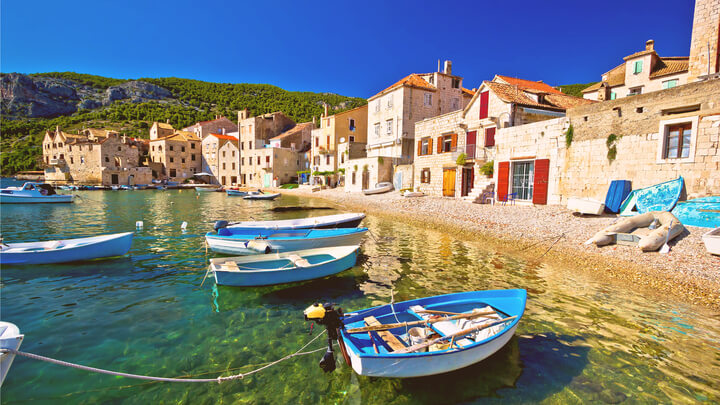How to open a Virgin Money Australia account. The steps, fees and requirements.
Looking for how to open a bank account with Virgin Money in Australia? We’ve got you covered. Here’s the process, fees and what you need to know.

As a relatively young independent state, Croatia has been slow to develop its economy and infrastructure. That said, the cost of living is some 30% less than the average European country. As a result, the expat community is growing. If you’re considering joining that community, here’s what you’ll need know to open a bank account.
Opening a bank account in Croatia is simple. You'll need:
If you don't have a residency permit, you can still open an account. The account will simply be classified as a ‘non-resident account.’ You'll be required to have an OIB, or ‘personal identification number’, which comes from the Ministry of Finance. The OIB is akin to a Social Security Number in the United States. It's required of all individuals who plan to bank, buy property, start a business, or reside in Croatia.
Certain Croatian banks will allow you to open an online account, which means that you can start the process before you're in the country. For example, Primorska Banka, allows you to open an online account by downloading the application, printing and signing it, and sending it along with a copy of approved identification. As long as you have a passport or Croatian foreign national ID card, you'll be verified. Croatia Banka and Raiffeisen Bank allow for a similar application process.
It's more common for Croatian banks to require that you visit a branch in-person to open an account. To facilitate the process, many banks employ English and German-speaking workers. Once opened, your accounts are generally accessible online.
As an expat, you might turn to a government bureau for help with Croatian banking. The Central Bank of Croatia is a public institution offering resources which explain Croatia’s financial and monetary policies.
While there are commercial expat agencies, most of them only assist with job search and recruitment. Certain banks have expat centres that are designed around an expat’s needs. For example, Zagrebacka Banka has a Centre for Non-Residents, where expats can open an account, arrange for online banking, consult with an expert on investing and doing business in Croatia and ask other questions.
In most cases, opening your account should be as easy as walking into a bank branch. You don't need an appointment to get started. A specialist will collect your information and set you up with your account. Most banks charge a nominal fee per month to manage the account, which can be as low as 5 kruna each month. The fee is often waived for students.
After you open your account, you'll have immediate access to your funds. However, it’ll take seven to ten days to receive your ATM card in the post. In the meantime, you'll have to withdraw funds in person.
Croatia is known to have a high concentration of foreign capital. Some of Croatia’s largest banks are foreign owned: Zagrebacka Banka is owned by the UniCredit Group of Italy, Privredna Banka by the Intesa Sanpaolo Group of Italy, and Erste & Steiermärkische Bank by Erste Group of Austria. Chances are if you bank with a major bank in Croatia, it will be foreign-owned.
You'll find the following international bank branches in Croatia:
Here are some popular Croatian retail banks which are worth checking if they’re right for your banking needs:
Many ATMs will limit your withdrawal to 2,000 kuna each day. ATMs with a ceiling of 3,000 kuna are out there, but aren’t easy to find. The Hrvatska Posta office allows you to withdraw up to 6,000 kuna per day, as long as you have your debit card and passport or official ID.
If you withdraw money from an ATM that's out of your network, you can expect to pay a nominal fee. Most Croatian bank accounts offer foreign exchange, and charge per transaction. Fees do vary by transaction size and by bank.
There's a great deal of variance in what you'll be charged at an ATM or bank. If you're dealing with foreign currency, expect a markup on the exchange rate. You may also encounter other hidden markups, commissions, and service charges. Keep in mind that the mid-market rate is the only true exchange rate. This is the rate you’ll find on google and which you can check in our online currency converter.
If you’re planning to send from another currency to Croatian kuna, you’ll be wanting to avoid unpleasant international transfer fees and get the fairest rate possible. If you have a bank account in Croatia or are planning to open one, use Transferwise to transfer at the mid-market rate and save the most money possible..
*Please see terms of use and product availability for your region or visit Wise fees and pricing for the most up to date pricing and fee information.
This publication is provided for general information purposes and does not constitute legal, tax or other professional advice from Wise Payments Limited or its subsidiaries and its affiliates, and it is not intended as a substitute for obtaining advice from a financial advisor or any other professional.
We make no representations, warranties or guarantees, whether expressed or implied, that the content in the publication is accurate, complete or up to date.

Looking for how to open a bank account with Virgin Money in Australia? We’ve got you covered. Here’s the process, fees and what you need to know.

Learn how to close your Revolut Australia account. The steps, options and important need-to-knows before your begin.

If you’re a student juggling study alongside work and social commitments, ensuring you have reliable and easy access to your money is essential. Choosing a...

Coming into student life something you might not think to address straight away is your banking. Many Australian banks offer accounts designed for students,...

Depending on the bank, student bank accounts might have extra features or slightly better conditions for those studying, when compared to a standard account....

Here’s how to close your ME Bank account and options to move your money out correctly